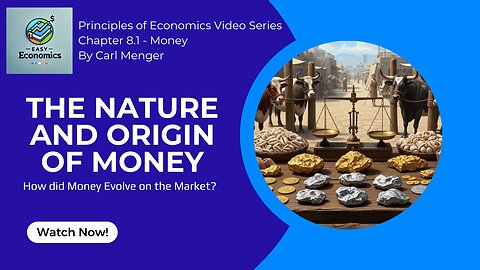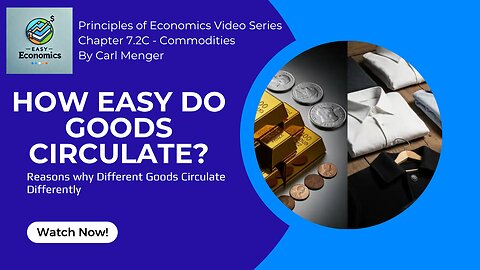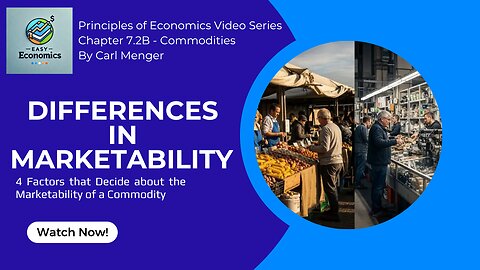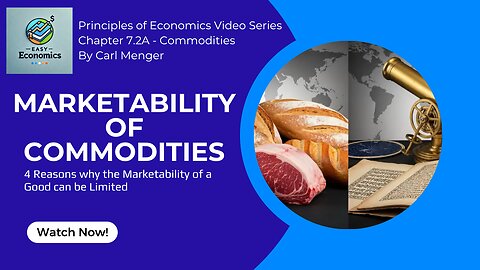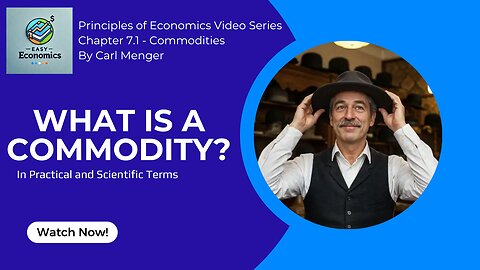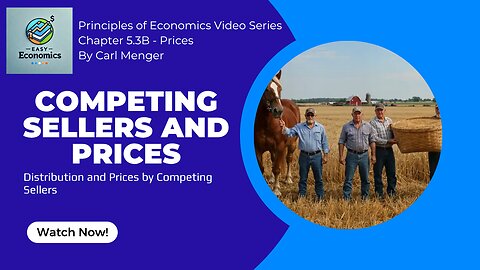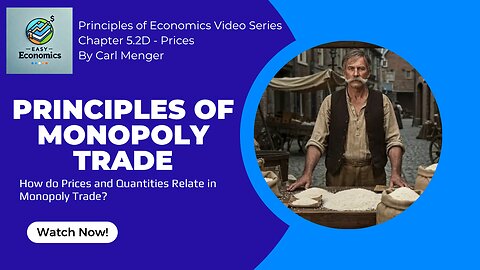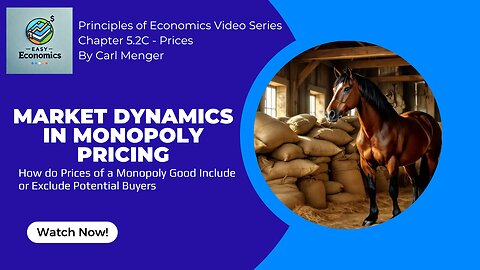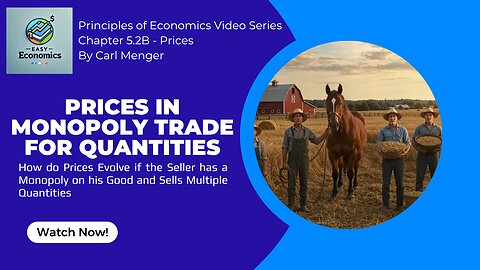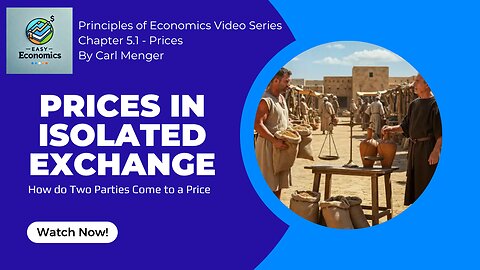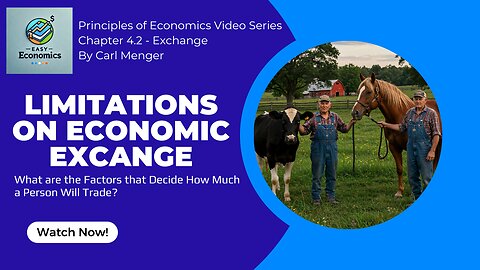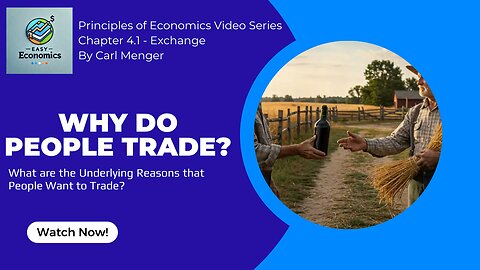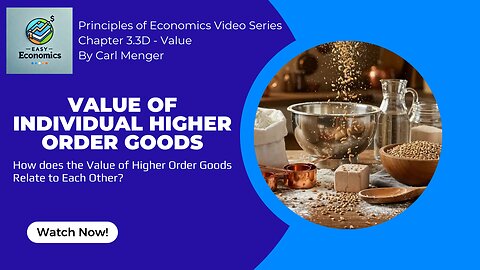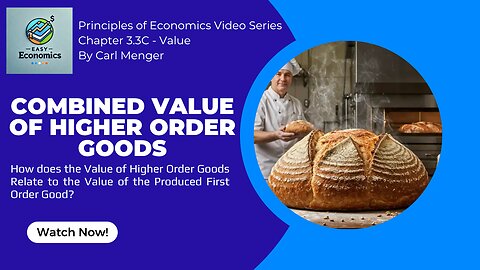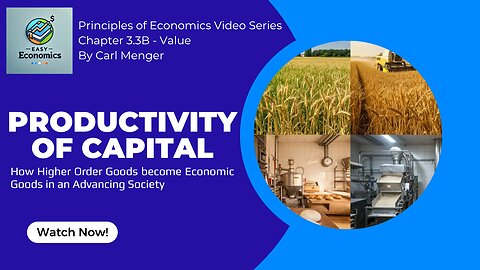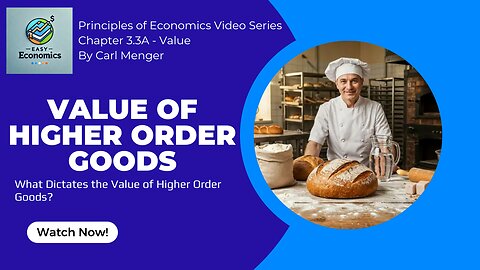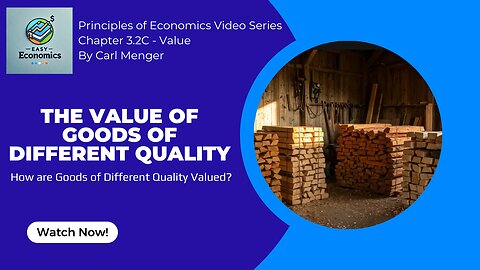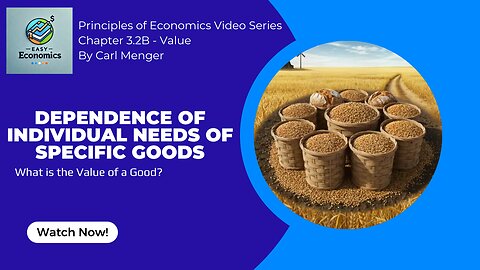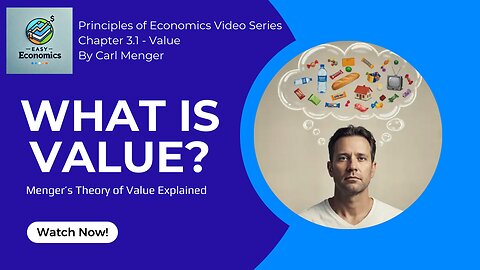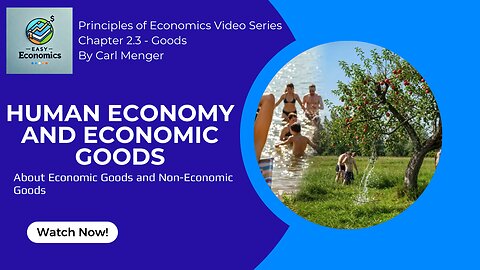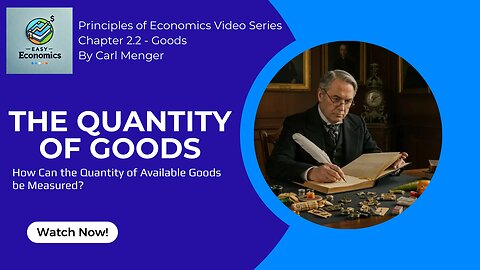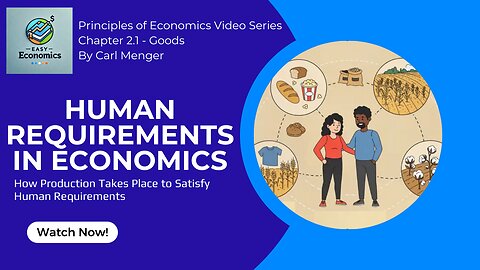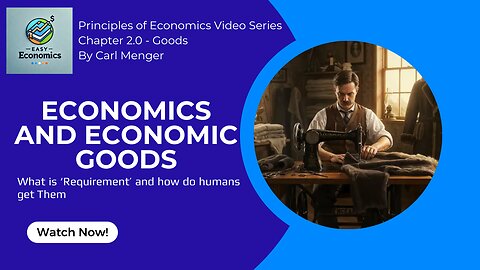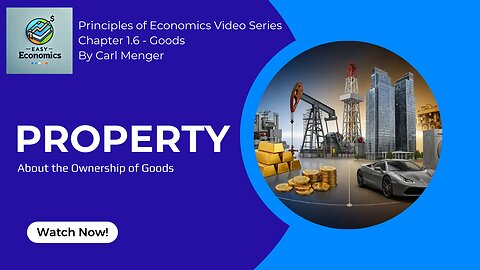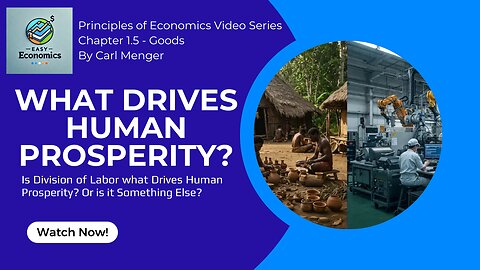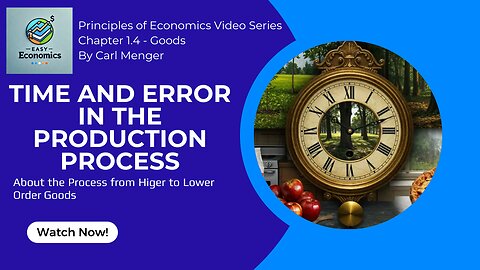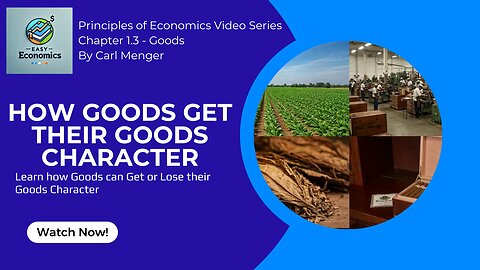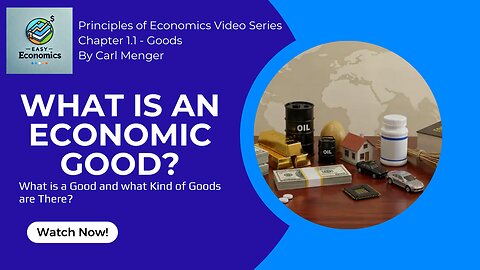Premium Only Content
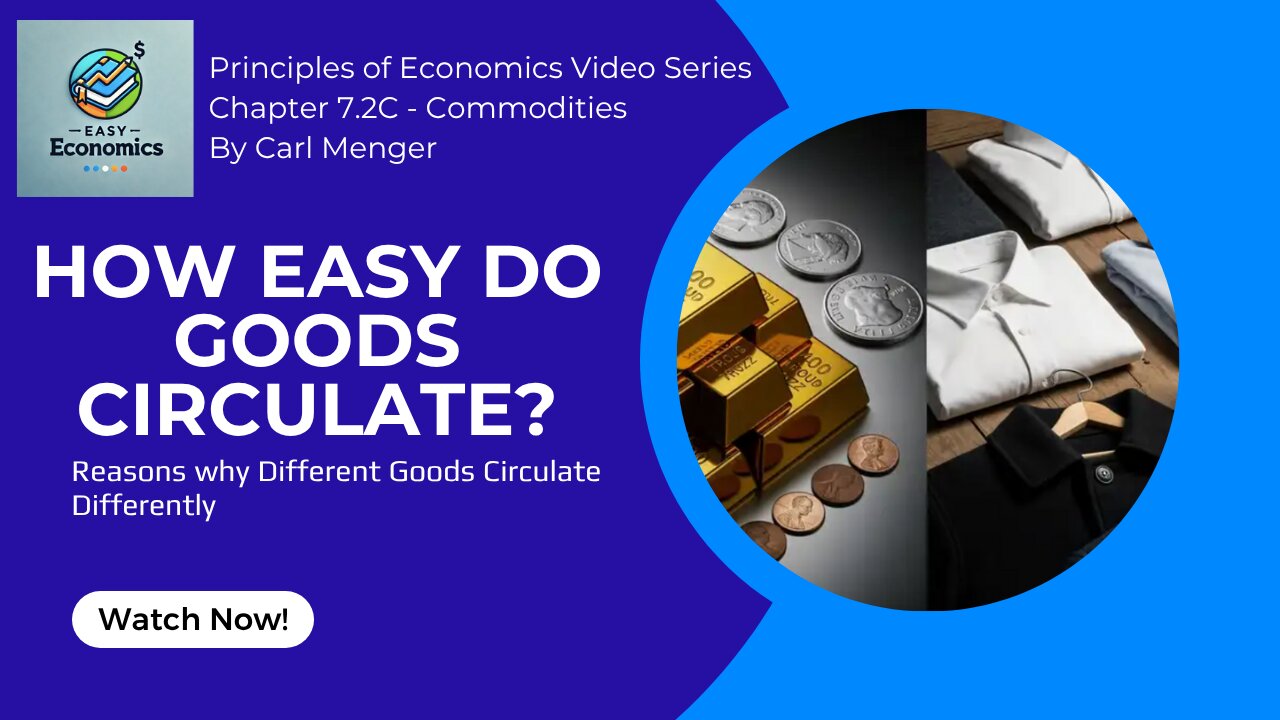
Principles of Economics by Carl Menger Chapter 8.1 - The Nature and Origin of Money
Principles of Economics by Carl Menger Chapter 7.2C - Circulability of Commodities
Principles of Economics by Carl Menger Chapter 7.2B - Differences in Marketability of Commodities
Principles of Economics by Carl Menger Chapter 7.2A - Marketability of Commodities
Principles of Economics by Carl Menger Chapter 7.1 - What is a Commodity?
Principles of Economics by Carl Menger Chapter 5.3C - Competition Policy
Principles of Economics by Carl Menger Chapter 5.3B - Price Formation by Competing Sellers
Principles of Economics by Carl Menger Chapter 5.3A - Price Forming and Distribution by Competition
Principles of Economics by Carl Menger Chapter 5.2D - Principles of Monopoly Trade
Principles of Economics by Carl Menger Chapter 5.2C - Market Dynamics of Monopoly Pricing
Principles of Economics by Carl Menger Chapter 5.2B - Price Forming in Monopoly Trade for Quantities
Principles of Economics by Carl Menger Chapter 5.2A - Price Formation in Monopoly Trade
Principles of Economics by Carl Menger Chapter 5.1 - Price Formation in Isolated Exchange
Principles of Economics by Carl Menger Chapter 5.0 - The Theory of Price
Principles of Economics by Carl Menger Chapter 4.2 - The Limits of Economic Exchange
Principles of Economics by Carl Menger Chapter 4.1 - Foundations of Economic Exchange
Principles of Economics by Carl Menger Chapter 3.3E - The Value of Land, Labour and Capital
Principles of Economics by Carl Menger Chapter 3.3D - The Value of Individual Higher Order Goods
Principles of Economics by Carl Menger Chapter 3.3C - Combined Value of Higher Order Goods
Principles of Economics by Carl Menger Chapter 3.3B - The Productivity of Capital
Principles of Economics by Carl Menger Chapter 3.3A - What Causes the Value of Higher Order Goods?
Principles of Economics by Carl Menger Chapter 3.2D - The Subjective Nature of the Measure of Value
Principles of Economics by Carl Menger Chapter 3.2C - Influence of the Quality of Goods on Value
Principles of Economics by Carl Menger Chapter 3 2B - The Value of Goods for Individual Needs
Principles of Economics by Carl Menger Chapter 3.2A - Difference in Importance for Individual Needs
Principles of Economics by Carl Menger Chapter 3.1 - The Theory of Value
Principles of Economics by Carl Menger Chapter 2.4 - What is Wealth?
Principles of Economics by Carl Menger Chapter 2.3 - Human Economy and Economic Goods
Principles of Economics by Carl Menger Chapter 2.2 - Available Quantities of Goods
Principles of Economics by Carl Menger Chapter 2.1 - Human Requirements in Economics
Principles of Economics by Carl Menger Chapter 2.0 - Economy and Economic Goods
Principles of Economics by Carl Menger Chapter 1.6 - Ownership of Goods
Principles of Economics by Carl Menger Chapter 1.5 - Causes of Human Prosperity
Principles of Economics by Carl Menger Chapter 1.4 -Time and Error in the Production Process
Principles of Economics by Carl Menger Chapter 1.3 - The Laws that Govern Goods Character
Principles of Economics by Carl Menger Chapter 1.2 - The Causal Connection Between Goods
Principles of Economics by Carl Menger Chapter 1.1 - The Nature of Goods
Principles of Economics by Carl Menger Chapter 7.2C - Circulability of Commodities
You want to read the book? Get it here: 👉
https://amzn.to/4exiAKW
Watch the next video in this series: https://rumble.com/v6w0q4i-principles-of-economics-by-carl-menger-chapter-8.1-the-nature-and-origin-of.html
Watch the video series from the start: https://rumble.com/playlists/I48mBTB4w2c
Watch our video about Carl Menger: https://rumble.com/v61z0l2-carl-menger-the-father-of-austrian-economics-and-subjective-value.html
Why do some goods circulate easily while others don’t—even if they’re valuable? In this video, we explore Carl Menger’s Principles of Economics, Section 7.2C: On the Circulability of Commodities.
We’ve already seen what makes some commodities more marketable than others. But marketability isn’t the whole story. Menger now takes it further: to circulate well, a good must be resellable by anyone, anywhere, at any time—without losing value.
Take gold: whether it’s held by a miner, trader, or investor, it keeps its value and sells easily. It’s highly circulable. But other goods—like food, used clothing, or personal items—may sell once but are hard to resell. Even if unused, fear of wear, spoilage, or mismatch kills their value in the next trade.
Other limits include:
Legal and technical barriers: Medicines, exports, or specialized tools require knowledge or permits to sell again.
Customization: Items like shoes or hats need expert fitting, which most people can’t offer.
Price uncertainty: Goods with unstable or hard-to-verify prices don’t move easily across hands.
In contrast, goods like grain, metals, or securities circulate well because they are durable, standardized, in wide demand, and backed by public market pricing.
Understanding circulability helps explain why some goods serve as money and others never can. It’s not just value that matters—it’s how easily and repeatedly a good can pass through hands without friction or loss.
❓ Questions This Video Answers:
-What does “circulability” mean in economics?
-Why do some valuable goods circulate poorly?
-How is marketability different from circulability?
-Why is gold highly circulable but food is not?
-What role do legal or technical barriers play in resale?
-How does price volatility affect resale potential?
-What makes securities or grain ideal for repeated trade?
-Why can’t custom goods circulate easily?
-How does circulability relate to money?
-What are the core qualities of a circulable good?
00:00 - Introduction to the Circulability of Commodities
00:12 - Circulability of Commodities
00:41 - Factors Affecting Circulation
01:38 - Specialized Goods and Price Stability
02:32 - Conclusion
03:25 - Outro
#Circulability #ResaleEconomics #CarlMenger
-
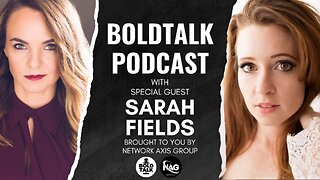 59:03
59:03
NAG Podcast
9 hours agoSarah Fields: BOLDTALK W/Angela Belcamino
39.4K9 -
 1:21:41
1:21:41
Glenn Greenwald
12 hours agoGlenn Takes Your Questions: On the Argentina Bailout, Money in Politics, and More; Plus: Journalist Jasper Nathaniel on Brutality and Settler Attacks in the West Bank | SYSTEM UPDATE #541
92K47 -
 3:10:08
3:10:08
Barry Cunningham
9 hours agoPRESIDENT TRUMP TO USE NUCLEAR OPTION? FOOD STAMPS END! | SHUTDOWN DAY 31
55.6K45 -
 1:06:56
1:06:56
BonginoReport
17 hours agoThe Battle Between Good & Evil w/ Demonologist Rick Hansen - Hayley Caronia (Ep.168)
105K39 -
 1:12:57
1:12:57
Kim Iversen
11 hours agoBill Gates Suddenly Says “Don’t Worry About Climate Change”?
94.1K68 -
 1:05:12
1:05:12
Michael Franzese
11 hours agoI Waited 50 Years to Tell You What Happened on Halloween 1975
47.6K20 -
 1:07:15
1:07:15
Candace Show Podcast
12 hours agoINFILTRATION: Charlie Kirk Was Being Tracked For Years. | Candace Ep 256
97.6K416 -
 9:17:19
9:17:19
Rallied
11 hours ago $4.26 earnedWarzone Solo Challenges then RedSec Domination
44K8 -
 2:34:30
2:34:30
Red Pill News
13 hours agoBoomerang Time - DOJ Investigating BLM Fraud on Red Pill News Live
75.5K18 -
 1:46:14
1:46:14
Roseanne Barr
13 hours ago“The Over Emotional Are Always Under Informed” | The Roseanne Barr Podcast #121
98.7K67
